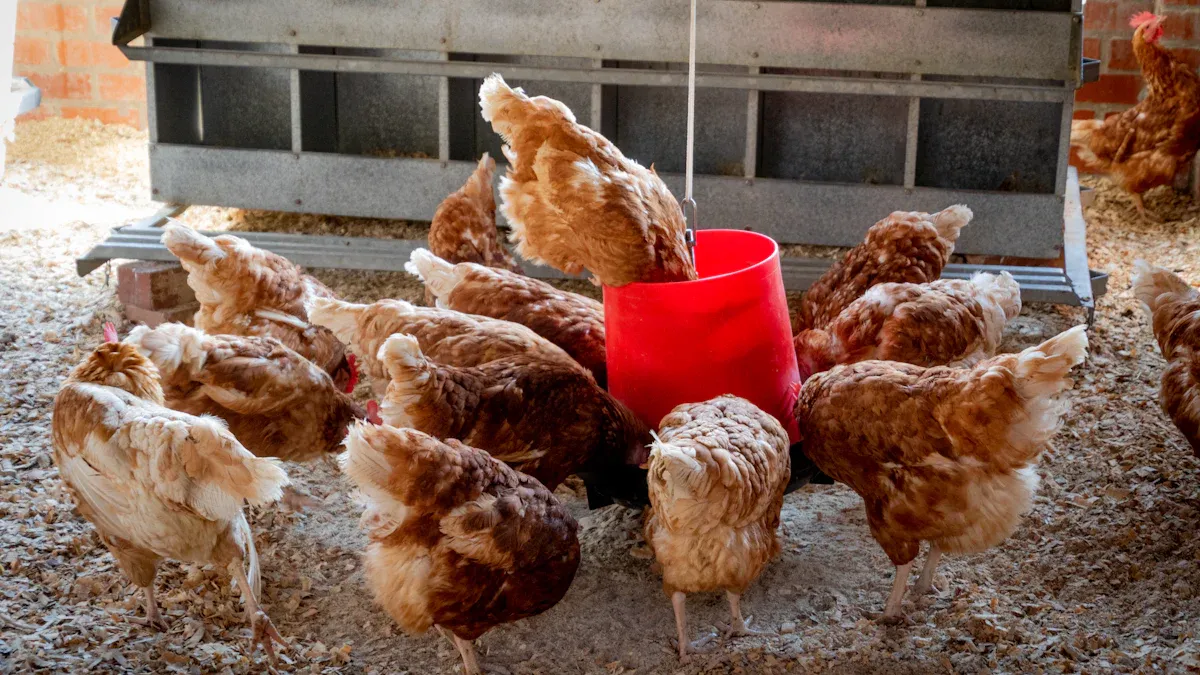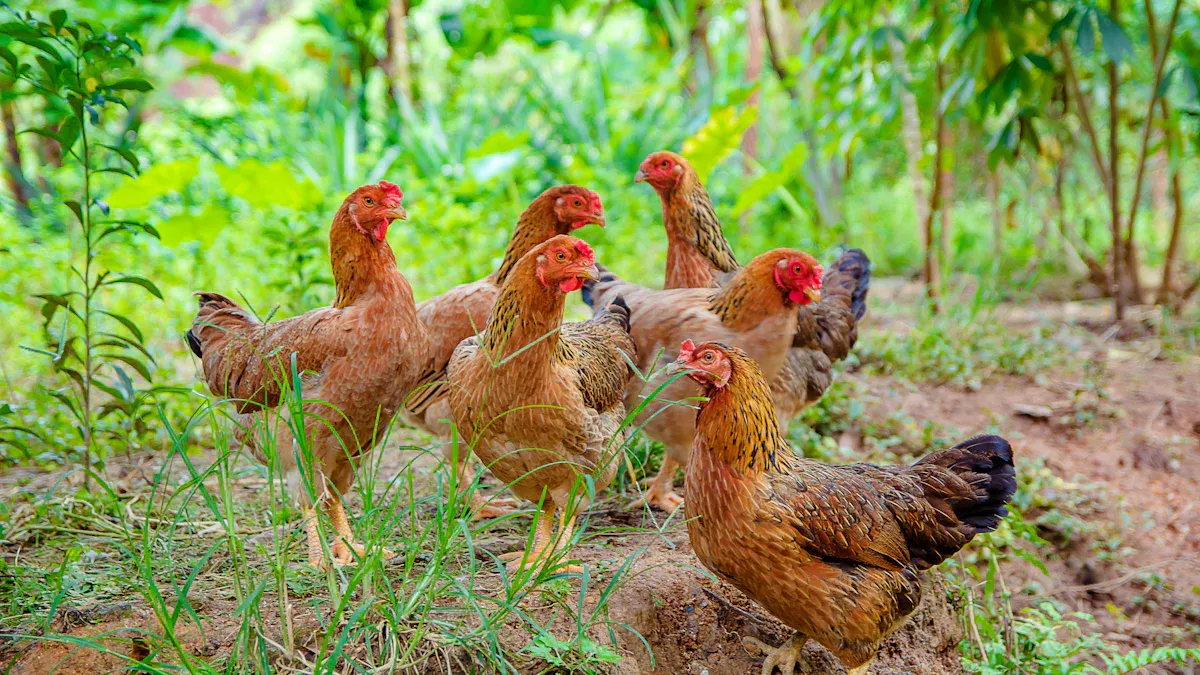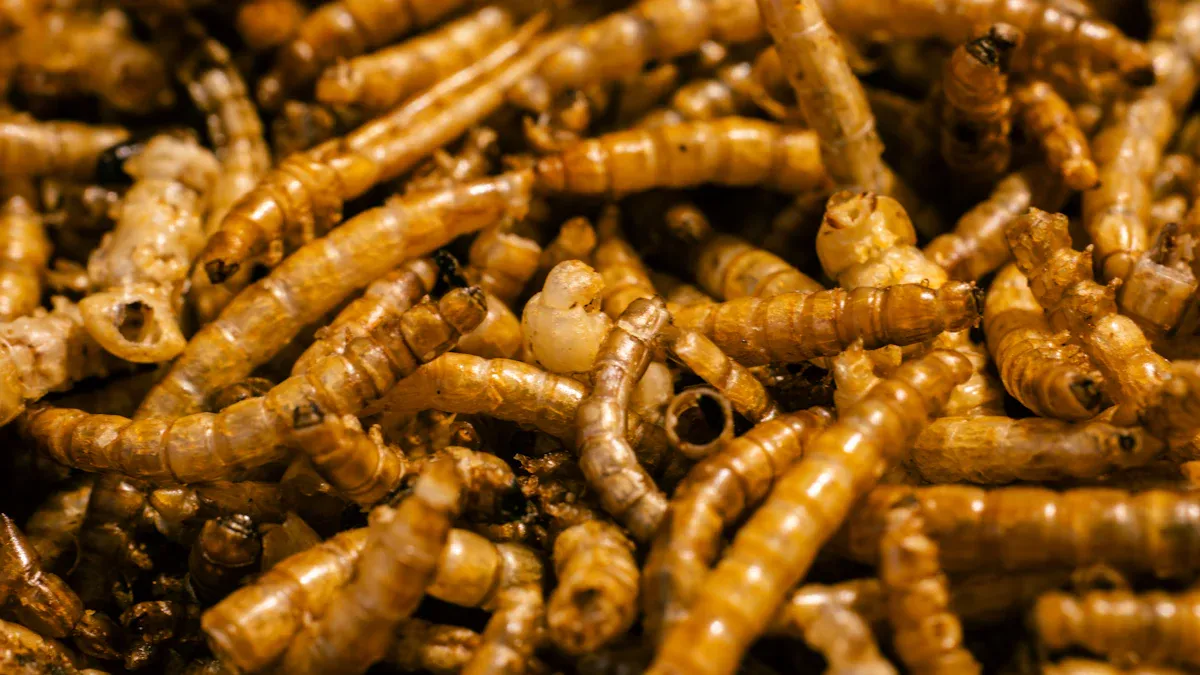
Mealworms are a powerhouse of nutrition for chickens. They’re packed with essential minerals like calcium, iron, and manganese. Calcium strengthens bones and supports blood clotting. Iron boosts overall health, while manganese aids enzyme function. With such benefits, mealworms chicken feed ensures chickens stay vibrant, healthy, and full of energy.
Key Takeaways
- Mealworms have lots of protein, about 60% of their weight. This helps chickens grow muscles and stay healthy.
- Giving mealworms to chickens makes eggshells stronger and yolks tastier. This means healthier and better-tasting eggs.
- Mealworms help chickens act naturally by searching for food. This keeps them busy and happy, improving their health.
Nutritional Benefits of Mealworms Chicken Feed

High Protein for Growth and Muscle Development
Protein is essential for chickens to grow strong and healthy. Mealworms are an excellent source of protein, containing up to 60% protein by weight. This makes them comparable to soybean meal, a common protein source in poultry diets. The high protein content in mealworms supports muscle development, helping chickens stay active and robust. It also plays a key role in tissue repair and overall growth, especially for young chicks and laying hens. Including mealworms chicken feed in their diet ensures they get the protein they need to thrive.
Essential Vitamins and Minerals for Balanced Nutrition
Mealworms are packed with essential nutrients that contribute to a balanced diet. They provide amino acids, fatty acids, and micronutrients like calcium, iron, and manganese. These nutrients are vital for bone strength, blood health, and enzyme function. For example, calcium helps hens produce stronger eggshells, while iron boosts their energy levels. By feeding chickens mealworms, you’re giving them a nutrient-dense option that supports their overall health and well-being.
Sustainable and Natural Feed Option
Mealworms are not just nutritious—they’re also a sustainable choice. Producing mealworms requires significantly less land and water compared to traditional protein sources like beef. For instance, 1 kilogram of mealworm protein needs only 22.38 m² of land and has a water footprint 3.5 times lower than beef. Additionally, mealworms emit fewer greenhouse gases, making them an eco-friendly alternative. Studies have shown that mealworms can match or even exceed the growth performance of fishmeal or soybean meal in poultry diets. By choosing mealworms chicken feed, you’re not only supporting your flock but also contributing to a healthier planet.
How Mealworms Enhance Egg Production
Bigger and Stronger Eggshells
Eggshell quality is a key indicator of a hen’s health. Mealworms provide a rich source of calcium and protein, both of which are essential for producing strong eggshells. Calcium strengthens the shell, reducing the chances of cracks or breakage. Protein, on the other hand, supports the hen’s overall health, ensuring she has the energy to lay consistently. Studies show that hens fed mealworms produce eggs with thicker shells, which are less likely to break during handling or transport. Adding mealworms chicken feed to their diet is a simple way to improve eggshell strength and durability.
Improved Egg Flavor and Nutritional Value
Mealworms don’t just benefit the hens—they also enhance the eggs they produce. The high-quality protein and nutrients in mealworms contribute to richer, more flavorful yolks. Many chicken owners notice a deeper yellow or orange hue in the yolks, which is often associated with better taste. Additionally, the nutritional value of the eggs improves. Eggs from hens fed mealworms tend to have higher levels of essential fatty acids and vitamins, making them a healthier choice for consumption. It’s a win-win for both chickens and their owners.
Consistent Egg-Laying Performance
Consistency in egg production is vital for any flock owner. Mealworms provide the protein and nutrients hens need to maintain steady egg-laying cycles. A well-nourished hen is less likely to experience dips in productivity, even during stressful periods like seasonal changes. Regular consumption of mealworms helps hens stay healthy and energized, ensuring they lay eggs more consistently. By incorporating mealworms into their diet, flock owners can enjoy a reliable supply of high-quality eggs year-round.
Mealworms as Support During Moulting

Moulting can be a stressful time for chickens. They lose feathers, their energy levels drop, and their immune systems may weaken. Mealworms can help ease this process by providing essential nutrients that support recovery and regrowth.
Energy Boost for Feather Regrowth
Feather regrowth requires a lot of energy and protein. Mealworms are an excellent source of protein, making them a perfect addition to a chicken’s diet during moulting.
- Mealworms contain up to 60% protein by weight.
- Protein helps repair tissues and promotes the growth of new feathers.
- Chickens fed mealworms often show faster feather regrowth and improved energy levels.
Adding mealworms chicken feed during moulting ensures chickens get the energy boost they need to recover quickly.
Strengthening Immunity During Stress
Stress during moulting can weaken a chicken’s immune system, leaving them vulnerable to illness. Studies have shown that mealworms can help strengthen immunity in poultry.
| Study | Findings |
|---|---|
| Kozlowski et al., 2021 | Mealworm larvae meal improves growth, feed utilization, and immunity. |
| Nieto et al., 2022 | Mealworm supplementation enhances poultry health and immunity. |
| Stastnik et al., 2021 | Mealworms may replace antibiotics, indirectly supporting immune health. |
Including mealworms in their diet helps chickens stay healthy and resilient during this challenging period.
Faster Recovery and Reduced Fatigue
Moulting can leave chickens feeling tired and sluggish. The high protein and nutrient content in mealworms speeds up recovery and reduces fatigue. Chickens regain their energy faster, allowing them to return to their normal activities. Mealworms also provide essential vitamins and minerals that support overall well-being, ensuring a smoother transition through the moulting phase.
Behavioral and Environmental Benefits of Mealworms Chicken Feed
Encouraging Natural Foraging Behavior
Chickens are natural foragers. They love scratching the ground, searching for tasty treats. Mealworms can encourage this instinctive behavior, keeping chickens active and engaged. Research highlights how mealworms stimulate natural foraging through contrafreeloading, where chickens prefer working for food rather than eating freely available feed. This behavior aligns with their natural instincts and promotes healthier, happier birds.
Providing Enrichment to Prevent Boredom
Boredom can lead to stress and unhealthy habits in chickens, like feather pecking. Mealworms offer a fun and rewarding way to keep chickens mentally stimulated. Studies show that hens trained to associate mealworms with specific cues experienced reduced stress and engaged in cognitive tasks. This enrichment not only prevents boredom but also improves their overall well-being.
| Study Focus | Methodology | Findings |
|---|---|---|
| Cognitive enrichment for chickens | Hens were trained to discriminate between cues involving mealworms as rewards | Mealworms reduced stress responses and engaged hens in cognitive tasks, alleviating boredom |
Supporting a Healthy Coop Environment
Mealworms contribute to a healthier coop environment in several ways:
- Their high protein content supports the overall health of chickens.
- They are low maintenance and reproduce quickly, making them a sustainable food source.
- Mealworms are nearly odorless, helping maintain a pleasant atmosphere in the coop.
By incorporating mealworms chicken feed into their diet, flock owners can create a more enriching and healthier environment for their birds.
Practical Tips for Feeding Mealworms
Ideal Serving Sizes and Frequency
Mealworms are a fantastic supplement, but moderation is key. Chickens love them, yet they should only make up about 5-10% of their diet. Overfeeding can lead to imbalances in nutrition. A handful of mealworms per chicken, two to three times a week, is usually enough to provide the benefits without overdoing it. For larger flocks, adjust the quantity proportionally. Remember, mealworms are a treat, not a replacement for their main feed.
Tip: Growing your own mealworms can be a cost-effective way to provide this nutritious snack while reducing overall feed costs.
Introducing Mealworms to Your Flock
Introducing mealworms to chickens can be fun and rewarding. Start by tossing a handful into the coop or run. Chickens will eagerly peck at them, and this method encourages natural foraging behavior. Alternatively, mix dried mealworms with their regular feed for an extra protein boost. For a more interactive approach, scatter mealworms around the run to keep chickens active and engaged.
Note: If you’re raising live mealworms, use smooth-sided containers with secure lids to prevent escapes. Keep the substrate dry and clean regularly to maintain a healthy environment.
Choosing Between Live, Dried, or Freeze-Dried Mealworms
When choosing mealworms, consider your flock’s needs and your convenience. Here’s a quick comparison:
| Type | Protein Content | Shelf Life | Convenience |
|---|---|---|---|
| Freeze-Dried | 60-70% | Longer | More convenient |
| Live | Varies | Shorter | Requires more care |
Live mealworms are a favorite among chickens due to their taste and movement, which stimulates natural hunting instincts. However, they require more care and have a shorter shelf life. Freeze-dried mealworms are easier to store and handle, making them a practical choice for busy flock owners. Dried mealworms also eliminate the risk of viruses that live mealworms might carry.
Mealworms are a game-changer for chicken health and vitality. They provide essential nutrients that support growth, egg production, and overall well-being. Here’s why they’re a must-have:
- Mealworms deliver a protein boost, meeting the 16% protein requirement for adult laying hens.
- They aid feather regrowth and immunity during moulting.
- Improved protein intake enhances egg size, flavor, and production.
Incorporating mealworms chicken feed into your flock’s diet ensures they thrive year-round. Healthy chickens mean happier owners!
FAQ
What are the best ways to store mealworms?
Tip: Store dried or freeze-dried mealworms in an airtight container in a cool, dry place. For live mealworms, keep them in a ventilated container with fresh bedding.
Can mealworms replace regular chicken feed?
Mealworms are a supplement, not a replacement. They provide extra protein and nutrients but should only make up 5-10% of a chicken’s diet.
Are mealworms safe for all chickens?
Yes, mealworms are safe for all chickens, including chicks and laying hens. However, adjust portion sizes based on the chicken’s age and dietary needs.


